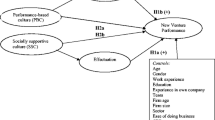Abstract
Entrepreneurial orientation (EO) has been proven as an essential attribute of high performing firms, and the role of culture has been highlighted for generating robust EO. The purpose of this study is to investigate the role of culture by identifying differences among the selected nations in terms of EO dimensions. This is an empirical study based on the data collected from university students in the U.S., Korea, Fiji, India, and Malaysia representing nations with significantly different cultural contexts. The result showed significant differences among the nations in most EO dimensions. This implies that customized education approaches based on unique cultural context are needed for developing EO among college students.
Similar content being viewed by others
References
Baum, J.R. (2003). Entrepreneurial orientation and strategic decision speed. Proceeding: Academy of Management Conference, Seattle, Washington.
Becherer, R. C., & Maurer, J. (1997). The moderating effect of environmental variables on the entrepreneurial and marketing orientation of entrepreneur-led firms. Entrepreneurship Theory and Practice, 22, 71–94.
Bettis, R., & Hitt, M. (1995). The new competitive landscape. Strategic Management Journal, 16(S1)), 7–19. doi:10.1002/smj.4250160915.
Bureau of Labor Statistics.(2008) Economy at a glance, http://www.bls.gov/eag/eag.us.htm#eag_us1.f.P, Accessed on October 22, 2008
Covin, J., & Slevin, D. (1989). Strategic management of small firms in hostile and benign environments. Strategic Management Journal, 10, 75–87. doi:10.1002/smj.4250100107.
Dess, G., Lumpkin, G., & Covin, J. (1997). Entrepreneurial strategy making and firm performance: Tests of contingency and configurational models. Strategic Management Journal, 18, 677–695. doi:10.1002/(SICI)1097-0266(199710)18:9<677::AID-SMJ905>3.0.CO;2-Q.
Dess, G., Lumpkin, G., & McGee, J. (1999). Linking corporate entrepreneurship to strategy, structure, and process: suggested research directions. Entrepreneurship: Theory & Practice, 23, 85–102.
Dilts, J. & Hanlon, S. (2002). Marketing strategy selection: Impact of entrepreneurial orientation and environmental perceptions. Marketing Management Journal, Spring, 32-48.
Franko, L. (1989). Global corporate competition: who’s winning, who’s losing, and the R&D factor as one reason why. Strategic Management Journal, 10(5), 449–474. doi:10.1002/smj.4250100505.
Gopalakrishnan, R. (2004). Unleashing Indian entrepreneurship-I: The changing mindset. Business Line, Chennai, Periodical, June 11, p.1. Accessed at http://www.thehindubusinessline.com/2004/01/26/stories/2004012601390300.htm on 26/01/2004.
Knight, G. (1997). Cross-cultural reliability and validity of a scale to measure firm entrepreneurial orientation. Journal of Business Venturing, 12, 213–225. doi:10.1016/S0883-9026(96)00065-1.
Kreiser, P. M., Marino, L. D., & Weaver, K. M. (2002). Assessing the psychometric properties of the entrepreneurial orientations scale: a multi-country analysis. Entrepreneurship:Theory and Practice, 26, 71–94.
Hemelgor, B. (2002). A competitive analysis of corporate entrepreneurial orientation between selected firms in the Netherlands and the USA. Entrepreneurship & Regional Development, 14, 67–87. doi:10.1080/08985620110087023.
Hughes, M., & Morgan, R. (2006). Deconstructing the relationship between entrepreneurial orientation and business performance at the embryonic stage of firm growth. Industrial Marketing Management, 36, 651–661. doi:10.1016/j.indmarman.2006.04.003.
Kao, I. (2009). Tapping the world’s innovation hot spots. Harvard Business Review, (March), 109−113.
Lee, S., & Peterson, S. (2000). Culture, entrepreneurial orientation, and global competitiveness. Journal of World Business, 35(4), 401–416. doi:10.1016/S1090-9516(00)00045-6.
Lee, L., & Sukoco, B. (2007). The effect of entrepreneurial orientation and knowledge management capability on organizational effectiveness in Taiwan: the moderating role of social capital. International Journal of Management, 24(3), 549–572.
Lee, S., & Lim, S. (2008). Entrepreneurial orientation and performance of service business, Service Business. International Journal (Toronto, Ont.), 3(1), 1–13.
Lee, S., Chang, D., & Lim, S. (2005). Impact of entrepreneurship education: A comparative study of the US and Korea. The International Entrepreneurship and Management Journal, 1(1), 27–43. doi:10.1007/s11365-005-6674-2.
Lee, S., Lim, S., Pathak, R., Chang, D., & Li, W. (2006). Influences on students attitudes toward entrepreneurship: a multi-country study. The International Entrepreneurship and Management Journal, 2(3), 351–366. doi:10.1007/s11365-006-0003-2.
Levenburg, N. M., & Schwarz, T. (2008). Entrepreneurial orientation among the youth of India:The impact of culture, education and environment. Journal of Entrepreneurship, 17(1), 15–35. doi:10.1177/097135570701700102.
Lumpkin, G. T., & Dess, G. G. (1996). Clarifying the entrepreneurial orientation construct and linking it to performance. Academy of Management Review, 21(1), 135–172. doi:10.2307/258632.
Marino, L., Strandholm, K., Steensma, H. K., & Weaver, K. M. (2002). The moderating effect of national culture on the relationship between entrepreneurial orientation and strategic alliance portfolio extensiveness. Entrepreneurship: Theory and Practice, 26, 145–160.
MECD.Annual Report. (2006). Putrajaya: Government Printers.
Miller, D. (1983). The correlates of entrepreneurship in three types of firms. Management Science, 29(7), 770–791. doi:10.1287/mnsc.29.7.770.
National Federation of Independent Business.(2008) accessed at http://www.nfib.com/object/IO_27804.html on September 25, 2008
Tarabishy, A., Solomon, G., Fernald, L., & Saghkin, M. (2005). The entrepreneurial leader’s impact on the organization’s performance in dynamic markets. Journal of Private Equity, (Fall), 20–29.
The US Census Bureau (2007), 2007 American Community Survey 1-Year Estimate.
Wikilund, J. (1999). The sustainability of the entrepreneurial orientation-performance relationship. Entrepreneurship: Theory and Practice, 24, 37–48.
Acknowledgement
We would like to recognize the following scholars who helped us collecting the data used in this study: Dr. Ahmad Z. bin Ismail, Bank Rakyat School of Entrepreneurship, Malaysia; Dr. Narendra Reddy, The University of the South Pacific, Fiji; Dr. Seema Zokarkar, Alard Institute of management Sciences, India
Author information
Authors and Affiliations
Corresponding author
Rights and permissions
About this article
Cite this article
Lee, S.M., Lim, Sb. & Pathak, R.D. Culture and entrepreneurial orientation: a multi-country study. Int Entrep Manag J 7, 1–15 (2011). https://doi.org/10.1007/s11365-009-0117-4
Received:
Accepted:
Published:
Issue Date:
DOI: https://doi.org/10.1007/s11365-009-0117-4




